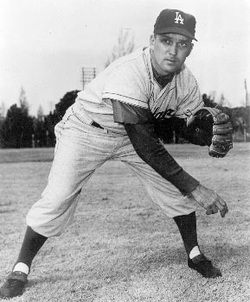
Erskine will always be remembered for what he contributed to the Dodgers. For his career, which spanned from 1948-1958, he was 122-78, 4.00 with most of his time as a starting pitcher. Because of the fact that the Dodgers always had good pitching, they were afforded the luxury of using Erskine in different roles, which sometimes included relief. He did have some injury problems, all which were related to the shoulder injury he suffered in his first big league start in 1948. He pitched through it, but was in such pain. In fact, he was unable to throw in between starts as he career wore on. This would lead to him retiring after the 1959 season, when the Dodgers were now in LA.
Newcombe was great when he joined the Dodgers staff, where Roe and Branca were still in the young stages of their career. But Newcombe, who was the ace, left the team for the 1952 and 1953 seasons, only to return in 1954. Branca was not the same pitcher, which allowed for Erskine to establish himself as a top pitcher. 1951 saw Erskine go 16-12, but that was with only 19 starts (and 27 relief appearances). Carl went 14-6, 2.70 with 10 CG in 1952. He led the staff in 1953, going 20-6, 3.54 with 246 2/3 IP. In 1954, though the team got Newcombe back, Erskine won 18 more games. He was up and down in the playoffs though, with a couple dominant performances and a couple duds. His lack of consistent dominance in the World Series led the Dodgers to rely on guys like Podres, and later on Koufax and Drysdale, to lead the staff for the latter 1950s into the 1960s.
The truth is, the Dodgers really needed Erskine from 1952-1954. He managed to pitch his baseball at that time. Without Newcombe, asking him to lead the staff was not an easy order. And considering the pain Erskine was pitching with, he does not get all the credit he deserves. Without Newcombe, Branca and Roe, Erskine was the bridge from them to Podres, Koufax and Drysdale. The Dodgers won the World Series in 1955, 1959, 1963 and 1965 and won the NL Pennant in 1947, 1949, 1952, 1953 and 1956. Erskine's pitching was a main reason the team won two of those Pennants. What is interesting is how he took the step back after the latter three established themselves. Yes, he was hurting. But he was able to take a stop behind Podres and Koufax, but still pitch very well in 1955 and 1956. After that, his arm couldn't hold up. The pitching healthy Dodgers need to continue to thank Carl Erskine for his dominance during the 1952-1954 seasons.

 RSS Feed
RSS Feed
